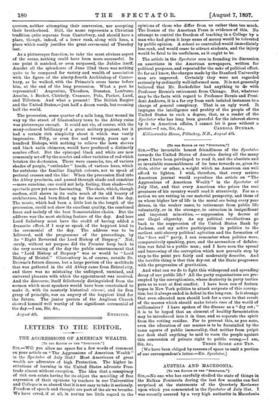LETTERS TO THE EDITOR.
THE AGGRESSIONS OF AMERICAN WEALTH.
[To THE EDITOR OP THE "SPECTATOR."] Sia,—Will you allow me space for a few words of comment on your article on" The Aggressions of American Wealth" in the Spectator of July 31st? Most Americans of great wealth are advocates of high Protection. The higher in- stitutions of learning in the United States advocate Free. trade almost without exception. The idea that a conspiracy of rich men exists having for its object the muzzling of free expression of their opinions by teachers in our Universities and Colleges is so absurd that it is not easy to take it seriously. Freedom of speech and thought are part of the air we breathe. We have erred, if at all, in paying too little regard to the
opinions of those who differ from us rather than too much. The license of the American Press is evidence of this. No attempt to control the freedom of teaching in a College by a man who had given it large sums of money would be tolerated by public opinion. A school so controlled would immediately lose rank, and would cease to attract students, and the injury would be fatal to its usefulness, as it ought to be.
The article in the Spectator errs in founding its discussion on assertions in the American newspapers, written for political purposes, and repeated for the sake of political effect. So far as I know, the charges made by the Stanford University man are unproved. Certainly they were not regarded seriously by ordinarily well-informed men. It is not generally believed that Mr. Rockefeller had anything to do with Professor Bernis's retirement from Chicago. But, whatever may be the facts with regard to Professor Bernie and Presi- dent Andrews, it is a far cry from such isolated instances to a charge of general conspiracy. That is an ugly word. It impugns the intelligence and probity of the people of the United States to such a degree, that, as a reader of the Spectator who has long been grateful for the interest shown by it in American affairs, I cannot let it pass without a
protest.—I am, Sir, &c., CARROLL DUNHAM.
.Killiecrankie House, Pitlochry, N.B., August 4th.
[TO THE EDITOR OP THE " SPECTATOR.]
Sut,—The invariable honest friendliness of the Spectator towards the United States of America during all the many years I have been privileged to read it, and the absolute and as invariable reasonableness of its tone towards us, gives its dicta, obiter or other, a weight which no American can well afford to lighten. I wish, therefore, that every serious American journal would reproduce the article on "The Aggressions of American Wealth" in the Spectator a July 31st, and that every American who prizes the real' greatness of his country would read it attentively. For as a nation we are rotting in our material prosperity, and those of us whose higher law of life is the moral are being every year driven, in the weaker cases, to retirement from public life voluntarily, or in the stronger, to ostracism in insignificant and impotent minorities, — suppression by decree of our illegal oligarchy. As my political recollections go- back to the suppression of the United States Bank by Jackson, and my active participation in politics to the earliest anti-slavery political agitation and the formation of the "free soil" party, I can remember when politics were, comparatively speaking, pure, and the accusation of defalca- tion was fatal to a public man ; and I have seen the spread' and burrowing of the corruption which now prevails step by step to the point you fairly and moderately describe. And the terrible thing is that this dry-rot of the State progresses- with the progression of gravitation.
And what can we do to fight this widespread and spreading decay of our public life ? All the party organisations are pre- empted by the corruptionists, whose dexterity in party tactics puts us to rout at first conflict. I have been one of forlorn- hopes in New York politics to attack outposts of this corrup- tion, but it always ended in defeat in the long run. Is it strange that even educated men should look for a cure to that revolt of the masses which should make tabula rasa of the world of millionaires ? I have spoken of the disease as a "dry rot ; " it is to be hoped that an element of healthy fermentation may be introduced into it in time, and so separate the spirit from the rotting residue. For to prevent this, as you note, even the education of our masses is to be forestalled by the tame agents of public immorality, that neither from pulpit nor desk shall anything be said to warn the people against this conversion of private right to public wrong.—I am, Sir, .31.C., THREE SCORE AND TEN. [We have been obliged by reasons of space to omit a portiont of our correspondent's letter.—En. Spectator.)


































 Previous page
Previous page